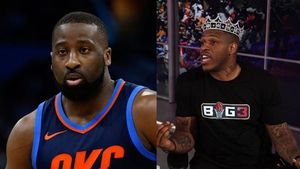Cheryl Hines, actress and wife of Robert F. Kennedy Jr., found herself at the center of controversy during her husband’s recent confirmation hearings for Secretary of Health and Human Services under President Donald Trump. Hines’s presence at the two-day event drew sharp criticism from various quarters, particularly from Laurie David, the ex-wife of comedian and writer Larry David, who took to social media to call out Hines for her supportive role.
David, known for her environmental activism and for producing the Oscar-winning documentary An Inconvenient Truth, slammed Hines on her Threads account, describing her performance as “the dutiful, adoring wife” who is “setting women back decades.” David's remarks highlighted the tensions surrounding the optics of Hines's public support for her husband, particularly as he faces scrutiny for his controversial views on health and vaccines.
Throughout the hearings, which were packed with supporters, many women—often mothers—showed up to back Kennedy. The atmosphere was electric; chants of “We love you, Bobby!” frequently drowned out protestors, many of whom wore hats reading “Say NO to RFK Jr.”
During the hearings, one protestor shouted, “He lies!” as Kennedy delivered his opening remarks, which resulted in their swift removal from the room. The scene was emblematic of the deep divisions surrounding Kennedy's candidacy.
Seated proudly in the front row, Hines grinned as Senator Bernie Sanders unloaded pointed questions at her husband. Sanders, using humor to drive his point home, asked Kennedy about his support for controversial onesies featuring anti-vaccine messages. “Are you supportive of these onesies?” Sanders quipped, the room erupting with laughter as they saw the resemblance between Kennedy and his fictional counterpart from Curb Your Enthusiasm.
Kennedy, known as “Bobby,” has gained notoriety as a celebrity influencer, leveraging his platform to address what he calls the “chronic disease epidemic.” Outside the Senate floor, Vani Hari, a food activist with millions of followers, chimed in, noting her disillusionment with government agencies. “I lost faith in my government and my regulatory agencies because I had to go and directly petition food companies to change because they weren't doing the right thing,” she asserted, supporting Kennedy’s proposed reforms aimed at banning harmful additives.
Yet not everyone is on board with Kennedy's vision. Critics express concern over his well-publicized conspiracy theories, which range from assertions linking vaccines to autism to claims about fluoride and Wi-Fi causing cancer. Registered nurse Laura Anderko voiced her trepidation, warning of the dangers of Kennedy’s influence on public health decisions, especially concerning vaccinations.
“His reliance on junk science and conspiracy theories is alarming,” she stated, urging the Senate to reconsider his potential appointment. Meanwhile, Dr. Manan Trivedi, wearing his lab coat, echoed similar sentiments, describing the hearings as “a circus” and comparing Kennedy’s atmosphere to one of “a rockstar, with all these people screaming his name,” showcasing the almost cult-like following Kennedy has amassed.
Even Senator Bill Cassidy, chair of the Senate committee assessing Kennedy, expressed hesitation about his candidacy after witnessing the fervor surrounding him. He told Kennedy, “You’ve got a following, man,” imploring him to make definitive statements about the safety of vaccines and their link to autism. “That would have an incredible impact,” Cassidy concluded, underscoring the weight Kennedy carries with his supporters and the wider public.
Hines’s role as the supportive spouse highlighted not only the personal dynamics at play but also the broader cultural implications of women’s roles during political spectacles. While Hines smiled confidently through questioning, her presence—and the criticisms it evoked—served as a reminder of the persistent debates over gender roles and political agency. With Robert F. Kennedy Jr. at the helm, the path forward for health policies remains contentious, deeply influenced by both the celebrity spotlight and the scrutiny of science.



